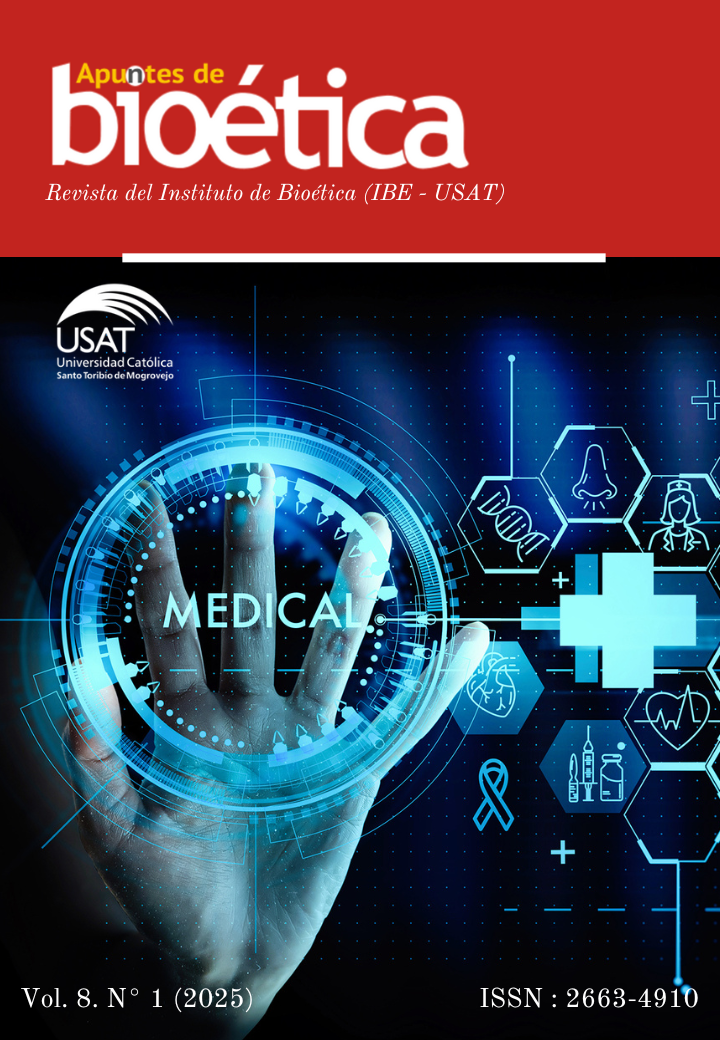Analysis from a personalist bioethics perspective on the role of the hospital pharmacist in euthanasia
Abstract
The word "euthanasia" comes from the Greek: "eu," meaning good, and "thanatos," meaning death; etymologically, it means "good death." However, in most legal texts, euthanasia is commonly defined as the medical act by which a person's death is caused directly and intentionally, with the person having voluntarily chosen it, due to a serious and incurable illness or a severe, chronic, and disabling condition. The regulation of euthanasia presents an ethical dilemma for the practice of healthcare professions, directly challenging their fundamental objective of caring for and safeguarding the lives of patients. The lack of training and information for hospital pharmacists in this area, as well as the progress made in developing responsible pharmaceutical care that is involved in the pharmacotherapy of patients, highlights the need for a thorough analysis of their roles and duties as healthcare professionals, as well as the implications of their involvement in euthanasia.
Downloads
References
Allen, W. J. & Brushwood, D. B. (1996). Pharmaceutically assisted death and the pharmacist's right of conscience. Journal of Pharmacy & Law, 5(1), 1-18.
American Society of Health-System Pharmacists. (1999). ASHP statement on pharmacist decision-making on assisted suicide. American Journal of Health-System Pharmacy, 56(16), 1661-1665. https://doi.org/10.1093/ajhp/56.16.1661
Buijsen, M. & Göttgens, W. (2020). And what about the pharmacist? Cambridge Quarterly of Healthcare Ethics, 29(3), 375-385. https://doi.org/10.1017/S0963180120000109
Consejo General de Colegios Farmacéuticos. (09 de enero de 2025). Código de Deontología de la Profesión Farmacéutica - 2023. Recuperado el 24 de agosto de 2024 de https://www.farmaceuticos.com/el-consejo-general/portal-transparencia/informacion-de-gestion-y-sobre-cumplimiento-normativo/deontologia/
Dixon, K. M. & Kier, K. L. (1998). Longing for mercy, requesting death: Pharmaceutical care and pharmaceutically assisted death. American Journal of Health-System Pharmacy, 55(6), 578-585. https://doi.org/10.1093/ajhp/55.6.578
Flood, B. (2020). Pharmacist and assisted dying. BMJ, m1139. https://doi.org/10.1136/bmj.m1139
Germán, R. (2020). Eutanasia: “Medicina” del deseo. Apuntes de Bioética, 3(1), 47-63. https://doi.org/10.35383/apuntes.v3i1.374
Heppler, C., & Strand, L. (1990). Opportunities and responsibilities in pharmaceutical care. American Journal of Hospital Pharmacy, 47(3), 533-543. https://doi.org/10.1093/ajhp/47.3.533
Ibañez Del Pino, R., Saíz, C., Rivas, S. & López Guzmán, J. (2021). La necesaria incorporación del farmacéutico comunitario al equipo interdisciplinar que asiste al enfermo en fase terminal. Apuntes de Bioética, 4(1), 88-101. https://doi.org/10.35383/apuntes.v4i1.482
Ley Orgánica 3/2021, de 24 de marzo, de regulación de la eutanasia. (2021). https://www.boe.es/eli/es/lo/2021/03/24/3
López, J. (2007). La implantación de la deontología farmacéutica en España. Cuadernos de Bioética, 18(2), 185-194. https://www.redalyc.org/articulo.oa?id=87506302
López, J. (2013). La bioética presente en los planes de estudio universitarios. Cuadernos de Bioética, 24(1), 79-90. https://www.redalyc.org/articulo.oa?id=87527461009
Mullan, K., Allen, W. L. & Brushwood, D. B. (1996). Conscientious objection to assisted death: Can pharmacy address this in a systematic fashion? Annals of Pharmacotherapy, 30(10), 1185-1191. https://doi.org/10.1177/106002809603001020
Radosta, D. I. (2021). Revisitando la categoría de cuidado: Un análisis ético del cuidado hospice. Apuntes de Bioética, 4(1), 32-51. https://doi.org/10.35383/apuntes.v4i1.587
Rupp, M. T. (1995). Physician-assisted suicide and the issues it raises for pharmacists. American Journal of Health-System Pharmacy, 52(13), 1455-1460. https://doi.org/10.1093/ajhp/52.13.1455
Sánchez, R. D. J. (2020). La objeción de conciencia frente a la eutanasia: Un análisis biojurídico. Apuntes de Bioética, 3(1), 89-97. https://doi.org/10.35383/apuntes.v3i1.398
Scheinderhan, M. E. (2000). Physician-assisted suicide and euthanasia: The pharmacist's perspective. Omega - Journal of Death and Dying, 40(1), 89-99. https://doi.org/10.2190/HUBF-9J5L-T40F-28PP
Sgreccia, E. (2009). Manual de Bioética. Biblioteca de autores cristianos.
Stein, G. C. (1998). Assisted suicide: An issue for pharmacists. American Journal of Health-System Pharmacy, 55(6), 539. https://doi.org/10.1093/ajhp/55.6.539
Tambou-Kamgue, E. (2022). El derecho a morir según Hans Jonás. Apuntes de Bioética, 5(1), 5-19. https://doi.org/10.35383/apuntes.v5i1.703
Velarde, C. (1997). J. López Guzmán. Objeción de conciencia farmacéutica. Ediciones Internacionales Universitarias, Barcelona. 165 pp. Persona Y Derecho, (39), 361-367. https://doi.org/10.15581/011.32898
Wagner, B. K. J. (1996). Pharmacist should not participate in abortion or assisted suicide. Annals of Pharmacotherapy, 30(10), 1192-1196. https://doi.org/10.1177/106002809603001021
Copyright (c) 2025 Esther Mateo-Folgado, José López-Guzmán (Autor/a)

This work is licensed under a Creative Commons Attribution 4.0 International License.
The authors retain copyright.
This work is under international license Creative Commons Attribution 4.0.
The articles published by the scientific journal "Notes on Bioethics" of the Universidad Catolica Santo Toribio de Mogrovejo, Chiclayo Peru, can be shared through the international public license Creative Commons Attribution CC BY 4.0
























 LIBRARY USAT
LIBRARY USAT